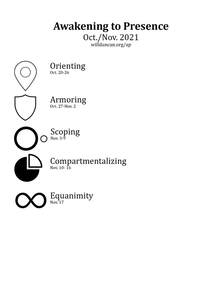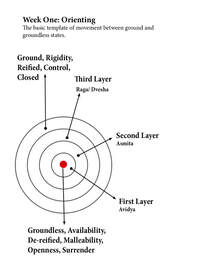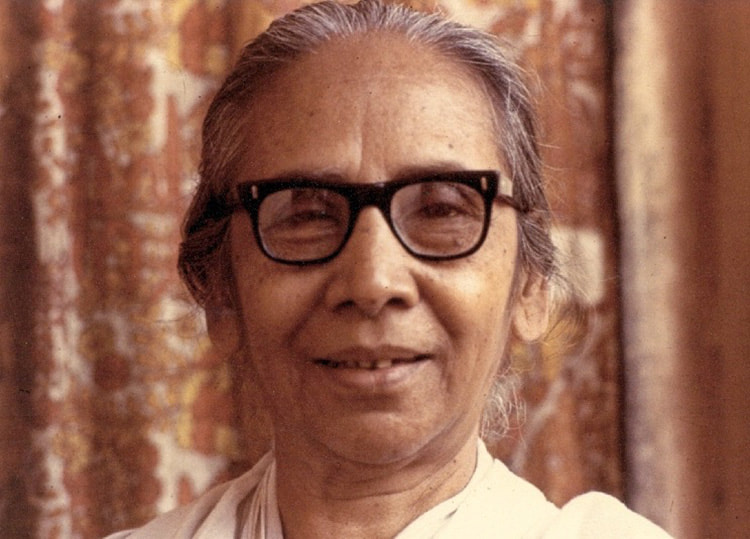Handouts, Class Links, audio
Link to one-on-one info:
Forgiveness Meditation:
| forgiveness_meditation.m4a |
Alternative Forgiveness Meditation:
| alt._forgiveness_practice.m4a |
Class recordings:
Week One:
https://us02web.zoom.us/rec/share/QcijKAYhXTLKbrUEilA0f2UEkt5hsRzbl6_bHI-E6wcQzlpU7Dwk32klxncCNX4a.coH3ids5VHKW2Elu
Passcode: 0M55v&GE
Passcode: 0M55v&GE
Week Two:
https://us02web.zoom.us/rec/share/XhqRo3aHOnKmh61aQ23X1K-xY4-mjn7hsWwkajCi5MwchSq1h4_1FiqmNH9mQ4pA.tKBTGcMbHQPtf8TD
Passcode: 9?V+SqkZ
Passcode: 9?V+SqkZ
Week Three:
https://us02web.zoom.us/rec/share/zBl_oq7_XgmIBSx6ANLlHp4casganEUvSjnNXhKDT0SLUkSc_tLr6zmlKy-uNmIM.E4skQ0Dn9vXEq6r-
Passcode: u+6xyBq5
Passcode: u+6xyBq5
Week Four:
https://us02web.zoom.us/rec/share/lEo6WFlfbSp0Rd5G93o1YAYF4vdLdExjUpAczuH3F-_3elAOFvEG6-PXDgN3rW8n.PfKj1b2uKhewyaUc
Passcode: 27@wYkAW
Passcode: 27@wYkAW
Week Five:
https://us02web.zoom.us/rec/share/DgYyREr8ULFcTOzI_OLvO5CPHQ9Q_csTZITe50ALRNHUVjEHdfamjfhYRNl1z_xx.dLihVizYtb7So5Jm
Passcode: ^WtYe*9=
Passcode: ^WtYe*9=
Course Review:
https://us02web.zoom.us/rec/share/Cl5ob9A42KiwXBbPlhbsnI1WWp7EoatHTv_aKgDnErTfmHSrx8PpUVe0RVSLDHJE.Zc_CrDJBZDeFnJul
Passcode: Y#?WE7ie
Passcode: Y#?WE7ie
Week One:
| |||
| |||
Week three:
Hold the sadness and pain of samsara in your heart and at the same time the power and vision of the Great Eastern Sun. Then the warrior can make a proper cup of tea.” Chögyam Trungpa
Two Truths
Fundamental Verses on the Middle Way - Mulamadhyamakakarika – Nagarjuna c. 150 – c. 250 CE (Nalanda)
15:9
If intrinsic nature does not exist, how could we ever alter it?
If intrinsic nature does exist, how could we ever alter it?
15:10
To say "it is" is to grasp for permanence.
To say "it is not" is to adopt the view of nihilism.
Therefore a wise person does not say "exists" or "does not exist"
24:8-10
The Buddha's teaching of the Dharma is based on two truths: a truth of worldly convention and an ultimate truth. Those who do not understand the distinction drawn between these two truths do not understand the Buddha's profound truth. Without a foundation in the conventional truth the significance of the ultimate cannot be taught. Without understanding the significance of the ultimate, liberation is not achieved.”
Fundamental Verses on the Middle Way - Mulamadhyamakakarika – Nagarjuna c. 150 – c. 250 CE (Nalanda)
15:9
If intrinsic nature does not exist, how could we ever alter it?
If intrinsic nature does exist, how could we ever alter it?
15:10
To say "it is" is to grasp for permanence.
To say "it is not" is to adopt the view of nihilism.
Therefore a wise person does not say "exists" or "does not exist"
24:8-10
The Buddha's teaching of the Dharma is based on two truths: a truth of worldly convention and an ultimate truth. Those who do not understand the distinction drawn between these two truths do not understand the Buddha's profound truth. Without a foundation in the conventional truth the significance of the ultimate cannot be taught. Without understanding the significance of the ultimate, liberation is not achieved.”
Misc. quotes on two truths
Nagarjuna based his statement of the two truths on the Kaccāyanagotta Sutta. In the Kaccāyanagotta Sutta, the Buddha speaking to the monk Kaccayana Gotta on the topic of right view, describes the middle Way between nihilsm and eternalism:
By and large, Kaccayana, this world is supported by a polarity, that of existence and non-existence. But when one sees the origination of the world as it actually is with right discernment, "non-existence" with reference to the world does not occur to one. When one sees the cessation of the world as it actually is with right discernment, "existence" with reference to the world does not occur to one.
D. T. Suzuki writes the following on the two truths in relation to The Lankavatara Sutra
The Lanka is quite explicit in assuming two forms of knowledge: the one for grasping the absolute or entering into the realm of Mind-only, and the other for understanding existence in its dual aspect in which logic prevails and the Vijnanas are active. The latter is designated Discrimination (vikalpa) in the Lanka and the former transcendental wisdom or knowledge (prajna). To distinguish these two forms of knowledge is most essential in Buddhist philosophy.
Chögyam Trungpa, The Myth of Freedom and the Way of Meditation
“Delight in itself is the approach of sanity. Delight is to open our eyes to the reality of the situation rather than siding with this or that point of view.”
Scholar Thomas McEvilley (2002) notes a correspondence between Greek Pyrrhonism and Madhyamika doctrines:
Sextus says that there are two criteria:
Susan Kahn in her paper "The Two Truths of Buddhism and The Emptiness of Emptiness" writes:
"The emptiness of emptiness refutes ultimate truth as yet another argument for essentialism under the guise of being beyond the conventional or as the foundation of it. To realize emptiness is not to find a transcendent place or truth to land in but to see the conventional as merely conventional. Here lies the key to liberation. For to see the deception is to be free of deception, like a magician who knows the magic trick. When one is no longer fooled by false appearances, phenomena are neither reified nor denied. They are understood interdependently, as ultimately empty and thus, as only conventionally real. This is the Middle Way."
Je Tsongkhapa writes;
“Since objects do not exist through their own nature, they are established as existing through the force of convention.”
Common saying of the Prasangikans:
“We do not say that because things are empty they do not exist; we say that because things exist they are empty.”
By and large, Kaccayana, this world is supported by a polarity, that of existence and non-existence. But when one sees the origination of the world as it actually is with right discernment, "non-existence" with reference to the world does not occur to one. When one sees the cessation of the world as it actually is with right discernment, "existence" with reference to the world does not occur to one.
D. T. Suzuki writes the following on the two truths in relation to The Lankavatara Sutra
The Lanka is quite explicit in assuming two forms of knowledge: the one for grasping the absolute or entering into the realm of Mind-only, and the other for understanding existence in its dual aspect in which logic prevails and the Vijnanas are active. The latter is designated Discrimination (vikalpa) in the Lanka and the former transcendental wisdom or knowledge (prajna). To distinguish these two forms of knowledge is most essential in Buddhist philosophy.
Chögyam Trungpa, The Myth of Freedom and the Way of Meditation
“Delight in itself is the approach of sanity. Delight is to open our eyes to the reality of the situation rather than siding with this or that point of view.”
Scholar Thomas McEvilley (2002) notes a correspondence between Greek Pyrrhonism and Madhyamika doctrines:
Sextus says that there are two criteria:
- [T]hat by which we judge reality and unreality, and
- [T]hat which we use as a guide in everyday life.
Susan Kahn in her paper "The Two Truths of Buddhism and The Emptiness of Emptiness" writes:
"The emptiness of emptiness refutes ultimate truth as yet another argument for essentialism under the guise of being beyond the conventional or as the foundation of it. To realize emptiness is not to find a transcendent place or truth to land in but to see the conventional as merely conventional. Here lies the key to liberation. For to see the deception is to be free of deception, like a magician who knows the magic trick. When one is no longer fooled by false appearances, phenomena are neither reified nor denied. They are understood interdependently, as ultimately empty and thus, as only conventionally real. This is the Middle Way."
Je Tsongkhapa writes;
“Since objects do not exist through their own nature, they are established as existing through the force of convention.”
Common saying of the Prasangikans:
“We do not say that because things are empty they do not exist; we say that because things exist they are empty.”
Week four:
More on Scope Fluidity
Chögyam Trungpa –
“Hold the sadness and pain of samsara in your heart and at the same time the power and vision of the Great Eastern Sun. Then the warrior can make a proper cup of tea.”
Robinson Jeffers -
Natural Music
The old voice of the ocean, the bird-chatter of little rivers…
…From different throats intone one language.
So I believe if we were strong enough to listen without
Divisions of desire and terror
To the storm of the sick nations, the rage of the hunger smitten cities,
Those voices also would be found
Clean as a child's; or like some girl's breathing who dances alone
By the ocean-shore, dreaming of lovers.
Some Quotes on AWE
An experience of such perceptual vastness you literally have to reconfigure your mental models of the world to assimilate it.”
JASON SILVA
Prototypical experiences of awe involve perceived vastness, anything that is experienced as much larger than the self or the self’s typical frame of reference.”
Dr. Dacher Keltner
“Awe is my religion and mystery is its church.”
Poet Charles Simic
“All he knew and felt was that what was happening was what had happened nearly a year before…at the deathbed of his brother. But that had been grief – this was joy. Yet that grief and this joy were alike outside all the ordinary conditions of life; they were loopholes, as it were, in that ordinary life through which came glimpses of something sublime. And in the contemplation of this sublime something the soul was exalted to inconceivable heights of which before it had no conception”
Anna Karenina end of chapter 14.
Chögyam Trungpa –
“Hold the sadness and pain of samsara in your heart and at the same time the power and vision of the Great Eastern Sun. Then the warrior can make a proper cup of tea.”
Robinson Jeffers -
Natural Music
The old voice of the ocean, the bird-chatter of little rivers…
…From different throats intone one language.
So I believe if we were strong enough to listen without
Divisions of desire and terror
To the storm of the sick nations, the rage of the hunger smitten cities,
Those voices also would be found
Clean as a child's; or like some girl's breathing who dances alone
By the ocean-shore, dreaming of lovers.
Some Quotes on AWE
An experience of such perceptual vastness you literally have to reconfigure your mental models of the world to assimilate it.”
JASON SILVA
Prototypical experiences of awe involve perceived vastness, anything that is experienced as much larger than the self or the self’s typical frame of reference.”
Dr. Dacher Keltner
“Awe is my religion and mystery is its church.”
Poet Charles Simic
“All he knew and felt was that what was happening was what had happened nearly a year before…at the deathbed of his brother. But that had been grief – this was joy. Yet that grief and this joy were alike outside all the ordinary conditions of life; they were loopholes, as it were, in that ordinary life through which came glimpses of something sublime. And in the contemplation of this sublime something the soul was exalted to inconceivable heights of which before it had no conception”
Anna Karenina end of chapter 14.
Week Five:
St John Of the Ladder
“Love and apatheia are distinguished by name and name only...To have apatheia (dispassion) is to have the fullness of love, by which I mean the complete indwelling of God”
Bhagavad Gita –
Giving up attachment, perform actions as a practice of yoga, Arjuna. Be the
same whether you are successful or unsuccessful; this equanimity is what is
called yoga. (2.48) BS
Arjuna, action alone is much inferior to action done with the yoga of understanding. Take refuge in understanding; those driven by the pursuit of
results are pathetic. (2.49) BS
"I don't ask for the sights in front of me to change, only the depth of my seeing."
Mary Oliver
“You can only do the practice. You can not make it work”
Sharon Salzberg
“The interior battle at this stage might also be understood as a form of anxiety, produced by a tension between the desire for comfort of the known and the now acknowledged need to stretch into the unknown.”
---Maslow
“Being in the face of things and seeing what is actually in front of me is the antidote to deppresion and to a feeling that one is worthless and has no value. 80% of my conciousness was closed off to what was really going on in this reality. And that closing off closed off my vitality and life energy”
- Eve Ensler
Rumi
This being human is a guest house.
Every morning a new arrival.
A joy, a depression, a meanness,
Some momentary awareness comes
As an unexpected visitor.
Welcome and entertain them all!
Even if they’re a crowd of sorrows,
Who violently sweep your house
Empty of its furniture,
Still, treat each guest honorably.
He may be clearing you out
For some new delight.
The dark thought, the shame, the malice,
Meet them at the door laughing,
And invite them in.
Be grateful for whoever comes,
Because each has been sent,
As a guide from beyond.
“Love and apatheia are distinguished by name and name only...To have apatheia (dispassion) is to have the fullness of love, by which I mean the complete indwelling of God”
Bhagavad Gita –
Giving up attachment, perform actions as a practice of yoga, Arjuna. Be the
same whether you are successful or unsuccessful; this equanimity is what is
called yoga. (2.48) BS
Arjuna, action alone is much inferior to action done with the yoga of understanding. Take refuge in understanding; those driven by the pursuit of
results are pathetic. (2.49) BS
"I don't ask for the sights in front of me to change, only the depth of my seeing."
Mary Oliver
“You can only do the practice. You can not make it work”
Sharon Salzberg
“The interior battle at this stage might also be understood as a form of anxiety, produced by a tension between the desire for comfort of the known and the now acknowledged need to stretch into the unknown.”
---Maslow
“Being in the face of things and seeing what is actually in front of me is the antidote to deppresion and to a feeling that one is worthless and has no value. 80% of my conciousness was closed off to what was really going on in this reality. And that closing off closed off my vitality and life energy”
- Eve Ensler
Rumi
This being human is a guest house.
Every morning a new arrival.
A joy, a depression, a meanness,
Some momentary awareness comes
As an unexpected visitor.
Welcome and entertain them all!
Even if they’re a crowd of sorrows,
Who violently sweep your house
Empty of its furniture,
Still, treat each guest honorably.
He may be clearing you out
For some new delight.
The dark thought, the shame, the malice,
Meet them at the door laughing,
And invite them in.
Be grateful for whoever comes,
Because each has been sent,
As a guide from beyond.
Meditation
|
"A formal on going practice of working on specific mental abilities for the purpose of greater states of well being, wholeness and awakening." - Will Duncan and Matthew Immergut Ph.D
"(Meditation is) a mental training... The goal of meditation is twofold. It involves (1) the conscious cultivation of mental qualities that enhance our understanding, power, and love, and (2) the intentional transformation or lessening of those mind states that block those qualities. " from Joel & Michelle Levey |
Meditative
Any activity done to calm, center or regulate the nervous system and the emotional heart.
Mindfulness
|
What is Mindfulness?:
1. Attention, Awareness, Non-reactivity
Moment to moment non-judgmental awareness. – John Kabat Zinn Concentration power, sensory clarity, and equanimity working together. – Shinzen Young Dispassionate non-evaluative monitoring of ongoing experience. - Unknown - An optimal interaction between attention and peripheral awareness. – John Yates |
ATTENTION AND AWARENESS
|
Differences Between Attention and Awareness
From John Yates: The Mind Illuminated Number of Objects Awareness = Many objects Attention = Limited objects Mental Processing Awareness = Minimal mental processing Attention = Greater levels of mental processing Contents Awareness = Physical senses (percepts – the five senses) Attention = Mind sense (concepts – thoughts, emotions, memories, etc) |
Biography Suggestions
|
Living this Life Fully: Stories and teachings of Munindra - Mirka Knaster and Joseph Goldstein (Stories from the life of a foundational Buddhist master) Dipa Ma: The life and legacy of a Buddhist master In Love with the World: A Monks Journey Through the Bardos of Living and Dying - Yongey Mingyur Rinpoche On the Path to Enlightenment: Heart Advice from the Great Buddhist Masters - Matthieu Ricard God's Fool: The Life and Times of Francis of Assisi - Julien Green (Perhaps slightly antiquated but the best bio of St. Francis I have come across) Story of a Soul: The Autobiography of St. Therese of Lisieux (A bit slow of a read at first but some gems hidden throughout if you stick with it) Ramakrishna and his Disciples - Christopher Isherwood (A great bio about a strange and unique Hindu saint) Miracle of Love: Stories About Neem Karoli Baba (Very wild stories about this famous modern day miracle working Hindu saint) A Man to Match His Mountains: Badshah Khan, Nonviolent Soldier of Islam. A difficult and essential read about an extraordinary man. Mystics, Masters, Saints and Sages - Stories of Enlightenment. A nice collection of many great hearted beings throughout the ages. |





